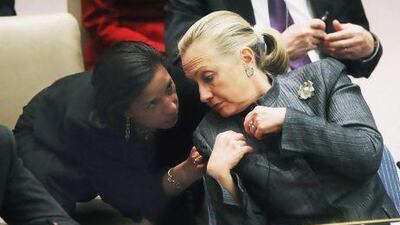WASHINGTON // The White House yesterday sought to defuse controversy over its handling of last year's killing of four Americans in Benghazi, releasing emails that show how Obama administration officials presented a scrubbed-down version of the attacks to the public.
The documents gave a glimpse into the administration's message control as officials carefully debated via email which details US Ambassador to the United Nations Susan Rice should highlight when she went on talk shows five days later to discuss the September 11 assault on the US mission in Benghazi, Libya.
There was little in the roughly 100 pages of emails about Ms Rice's "talking points" that had not been leaked previously.
They included an email confirming perhaps the most damaging charge that administration officials removed mention from Ms Rice's talking points that the CIA had warned of an Al Qaeda threat in the area of the eastern Libyan city before the attacks.
The exchange between White House, State Department and intelligence officials showed the talking points went through a series of revisions that scrubbed them of references to terror warnings before Ambassador Chris Stevens and three other Americans were killed.
While awkward for the White House, releasing the emails was an effort to counter complaints from Republicans and the media that President Barack Obama's administration is secretive.
It came as the government was battling criticism on several fronts, including a scandal over the Internal Revenue Service's targeting of conservative groups for special scrutiny.
In the Benghazi emails, then-State Department spokeswoman Victoria Nuland raised concerns about references to intelligence about the threat from militants in eastern Libya.
Ms Nuland wrote that she had "serious concerns" that the talking points would provide members of Congress with material to "beat the State Department for not paying attention to [Central Intelligence] Agency warnings" about threats in the region.
Those references were deleted from the final talking points that Ms Rice used on the Sunday morning talk shows on September 16.
Ms Nuland noted in one of her emails that changes during the draft process "don't resolve all my issues or those of my building leadership," suggesting officials above her at the State Department were also concerned.
It was not clear who she was referring to but Republicans have tried to link former Secretary of State Hillary Clinton, a possible Democratic candidate for president in 2016, to the controversy over Benghazi.
"The seemingly political nature of the State Department's concerns raises questions about the motivations behind these changes and who at the State Department was seeking them," said Brendan Buck, a spokesman for Republican Speaker of the House of Representatives John Boehner.
Republicans say the talking points were an attempt to portray the attacks as arising from a spontaneous protest, and not an organised militant assault, so as to protect Mr Obama in last year's presidential campaign from any charges that he was weak on fighting terrorism.
The White House vehemently denies any cover-up and emphasises that the controversy over the talking points focuses on intelligence that eventually evolved. The emails, officials said, showed a normal back and forth between government agencies on a fluid national security event.
"Collectively these emails make clear that the interagency process, including the White House's interactions, were focused on providing the facts as we knew them based on the best information available at the time and protecting an ongoing investigation," White House spokesman Eric Schultz said.

